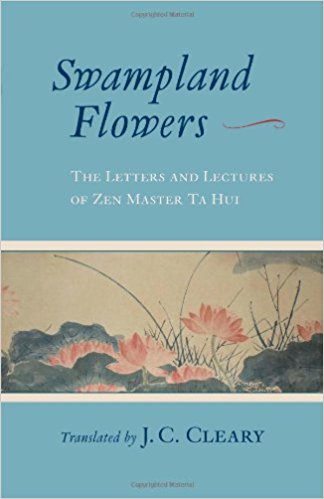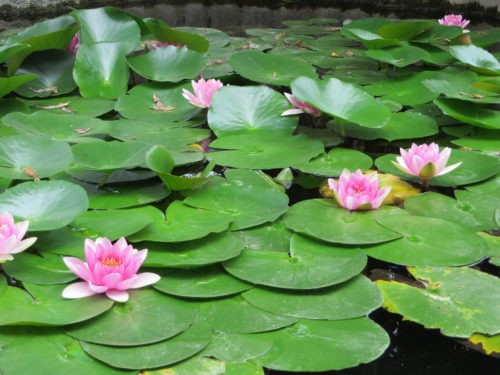A review of Swampland Flowers: The Letters and Lectures of Zen Master Ta Hui translated by J.C. Cleary
Vimalakirti said, “It’s like this: the high plateau does not produce lotus flowers; it is the mire of the low swamplands that produces these flowers.”
 About five years ago I read Swampland Flowers for the first time, inspired by Nyogen Roshi who frequently quoted it in his talks. Afterwards, I was flamboyant in my praise, writing in an online review: “If you have to read one book, read this. Hands down, it is the most penetrating, clear, unequivocal, brilliant truth that you can actually live by.” A wonder then, that I never read it again, although I wholeheartedly recommended it to others. When I tried to buy a new paperback copy recently, I was surprised to learn that this essential Zen resource is out of print. (The ebook is available.) But really, I wasn’t that surprised. After all, few people have ever been able to appreciate the undiluted Dharma, a fact grasped by Ta Hui more nearly 900 years ago when he wrote, “There’s not much to the Buddha Dharma, but it’s always hard to find capable people.”
About five years ago I read Swampland Flowers for the first time, inspired by Nyogen Roshi who frequently quoted it in his talks. Afterwards, I was flamboyant in my praise, writing in an online review: “If you have to read one book, read this. Hands down, it is the most penetrating, clear, unequivocal, brilliant truth that you can actually live by.” A wonder then, that I never read it again, although I wholeheartedly recommended it to others. When I tried to buy a new paperback copy recently, I was surprised to learn that this essential Zen resource is out of print. (The ebook is available.) But really, I wasn’t that surprised. After all, few people have ever been able to appreciate the undiluted Dharma, a fact grasped by Ta Hui more nearly 900 years ago when he wrote, “There’s not much to the Buddha Dharma, but it’s always hard to find capable people.”
Ta Hui lived from 1089 to 1163 and spent 58 years practicing Chan.
Swampland Flowers consists of portions of Ta Hui’s letters and lectures given primarily to lay practitioners. The tone is personal, energetic, and direct. In the Sung Dynasty of his day, Chan had been popularized by the highest echelons of the cultural elite, a development that Ta Hui and his teacher Yuan Wu (the compiler of the Blue Cliff Record ) frankly regarded as apocalyptic. They frequently railed against the worldly ambitions of “phony” Chan followers, and sought to revive what Nyogen Roshi might today call “blue-collar Zen.” Outside of the institutional establishment that he considered a ruse and cliché, Ta Hui invested his teaching in the ordinary people being squeezed by the pressures of their lowly place in a money-plundering oligarchy. And from that comes the book’s timeless relevance.
Page by page, Ta Hui treats every correspondent as an intimate friend and every question as urgent. His responses carry the warmth of familiarity and the sharp whack of clarity. In each exchange, he brings the wandering mind back to the point, place and time of practice: where you are as you are.
Life is hard. Hardship is the place of practice. If you despise the commotion of your daily life, he points out, that’s where you practice. The whole point of meditation is to use our power in the midst of the mire. “If you just manage to cradle the uncrying child in your arms, what’s the use?” Let’s get real, he’s saying. Easy times take care of themselves.
Don’t get religious. Ta Hui warns against making Chan, or Zen, a high-minded object of “veneration and faith.” Indeed, he heaps scorn on any escape from the scene right where you are standing. “When has it ever been necessary to leave wife and children, quit one’s job, chew on vegetable roots, and cause pain to the body? If you want to study this Path, you must understand right where you are. When you’ve comprehended the scene right where you are, then all kinds of knowledge without exception are things right where you are.”
You have the time. Just don’t separate yourself from your life. “First-class times to make efforts to arouse and alert yourself and awaken: while eating and drinking, joyful or angry, in clean places or unclean places, in family gatherings, when entertaining guests,” and, excluding no one, “in the thick of wealth and rank.” Then, it’s simple. “Just observe whether or not you are befuddled in the conduct of your daily activities.”
It’s not complicated. What is the meaning of Buddhism? Simple: “Winter is cold and summer is hot, night is dark and day is light. It’s just that you vainly set up meaning where there is no meaning, create concern where there is no concern, impose ‘inside’ and ‘outside’ where there is no inside or outside, and talk endlessly of this and that where nothing exists.” Be totally without knowledge and understanding, he says, “like a three-year-old child.”
Don’t worry. “When you don’t exert your mind, everything appears.”
Swampland Flowers proves that the living Dharma is always as vibrantly real and present as you, even when the words are out of print.

